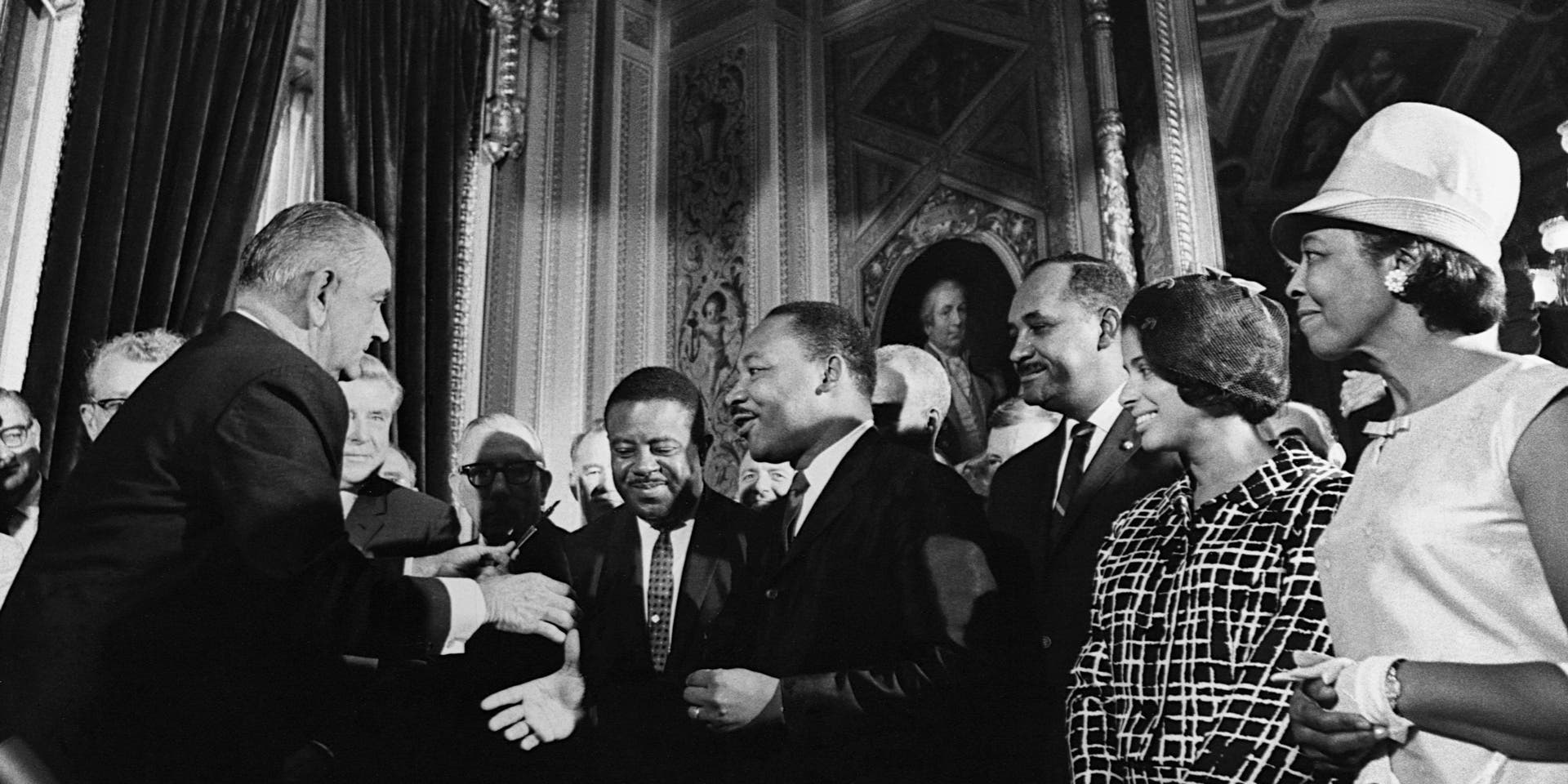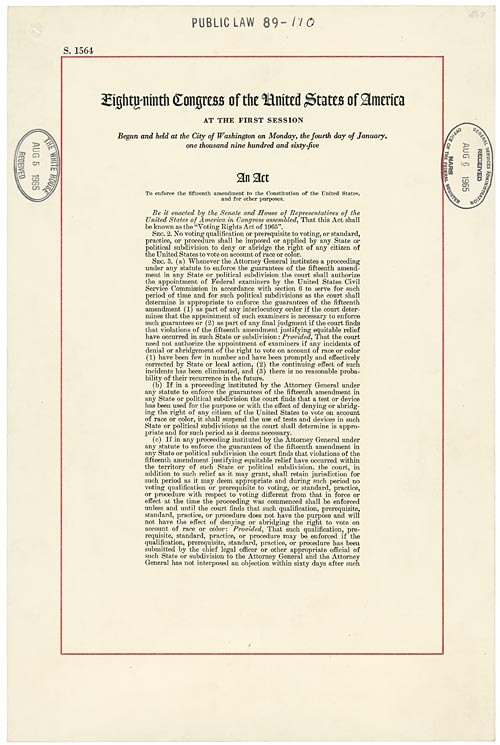

The Voting Rights Act of 1965, signed into law by President Lyndon B. Johnson, aimed to overcome legal barriers at the state and local levels that prevented African Americans from exercising their right to vote as guaranteed under the 15th Amendment to the U.S. Constitution. The Voting Rights Act is considered one of the most far-reaching pieces of civil rights legislation in U.S. history.

*****An act to enforce the fifteenth amendment to the Constitution of the United States and for other purposes, August 6, 1965; Enrolled Acts and Resolutions of Congress, 1789-; General Records of the United States Government; Record Group 11; National Archives
This act was signed into law on August 6, 1965, by President Lyndon Johnson. It outlawed the discriminatory voting practices adopted in many southern states after the Civil War, including literacy tests as a prerequisite to voting.
The 15th Amendment to the U.S. Constitution states: “The right of citizens of the United States to vote shall not be denied or abridged by the United States or by any State on account of race, color, or previous condition of servitude.”
Despite the amendment's passage, by the late 1870s dozens of discriminatory practices were used to prevent Black citizens from exercising their right to vote, especially in the South.
This “act to enforce the fifteenth amendment to the Constitution” was signed into law 95 years after the amendment was ratified. In those years, African Americans in the South faced tremendous obstacles to voting, including poll taxes, literacy tests, and other bureaucratic restrictions to deny them the right to vote. They also risked harassment, intimidation, economic reprisals, and physical violence when they tried to register or vote. As a result, African-American voter registration was limited, along with political power.
In 1964, numerous peaceful demonstrations were organized by Civil Rights leaders, and the considerable violence they were met with brought renewed attention to the issue of voting rights. The murder of voting-rights activists in Mississippi and the attack by white state troopers on peaceful marchers in Selma, Alabama, gained national attention and persuaded President Johnson and Congress to initiate meaningful and effective national voting rights legislation. The combination of public revulsion to the violence and Johnson's political skills stimulated Congress to pass the voting rights bill on August 5, 1965.
The legislation, which President Johnson signed into law the next day, outlawed literacy tests and provided for the appointment of federal examiners (with the power to register qualified citizens to vote) in those jurisdictions that were "covered" according to a formula provided in the statute. In addition, Section 5 of the act required covered jurisdictions to obtain "preclearance" from either the District Court for the District of Columbia or the U.S. Attorney General for any new voting practices and procedures. Section 2, which closely followed the language of the 15th amendment, applied a nationwide prohibition of the denial or abridgment of the right to vote on account of race or color. The use of poll taxes in national elections had been abolished by the 24th amendment (1964) to the Constitution; the Voting Rights Act directed the Attorney General to challenge the use of poll taxes in state and local elections. In Harper v. Virginia State Board of Elections, 383 U.S. 663 (1966), the Supreme Court held Virginia's poll tax to be unconstitutional under the 14th amendment.
The Voting Rights Act of 1965 was the most significant statutory change in the relationship between the federal and state governments in the area of voting since the Reconstruction period following the Civil War; and it was immediately challenged in the courts. Between 1965 and 1969, the Supreme Court issued several key decisions upholding the constitutionality of Section 5 and affirming the broad range of voting practices for which preclearance was required. [See South Carolina v. Katzenbach, 383 U.S. 301, 327-28 (1966) and Allen v. State Board of Elections, 393 U.S. 544 (1969)] In 2013, the Court struck down a key provision of the act involving federal oversight of voting rules in nine states.
The Voting Rights Act had an immediate impact. By the end of 1965, a quarter of a million new Black voters had been registered, one-third by federal examiners. By the end of 1966, only four out of 13 southern states had fewer than 50 percent of African Americans registered to vote. The Voting Rights Act of 1965 was readopted and strengthened in 1970, 1975, and 1982.
"AN ACT To enforce the fifteenth amendment to the Constitution of the United States, and for other purposes.
Be it enacted by the Senate and House of Representatives of the United States of America in Congress assembled, That this Act shall be known as the "Voting Rights Act of 1965."
SEC. 2. No voting qualification or prerequisite to voting, or standard, practice, or procedure shall be imposed or applied by any State or political subdivision to deny or abridge the right of any citizen of the United States to vote on account of race or color.
Lyndon B. Johnson assumed the presidency in November 1963 upon the assassination of President John F. Kennedy. In the presidential race of 1964, Johnson was officially elected in a landslide victory and used this mandate to push for legislation he believed would improve the American way of life, such as stronger voting-rights laws.
After the Civil War, the 15th Amendment, ratified in 1870, prohibited states from denying a male citizen the right to vote based on “race, color or previous condition of servitude.” Nevertheless, in the ensuing decades, various discriminatory practices were used to prevent African Americans, particularly those in the South, from exercising their right to vote.
During the civil rights movement of the 1950s and 1960s, voting rights activists in the South were subjected to various forms of mistreatment and violence. One event that outraged many Americans occurred on March 7, 1965, when peaceful participants in a Selma to Montgomery march for voting rights were met by Alabama state troopers who attacked them with nightsticks, tear gas and whips after they refused to turn back.
Some protesters were severely beaten and bloodied, and others ran for their lives. The incident was captured on national television.
In the wake of the shocking incident, Johnson called for comprehensive voting rights legislation. In a speech to a joint session of Congress on March 15, 1965, the president outlined the devious ways in which election officials denied African American citizens the vote.